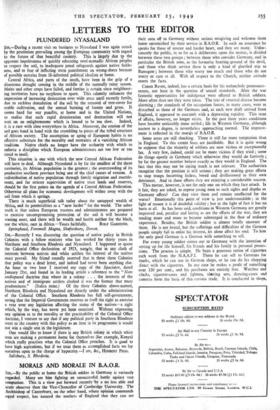MORALS AND MORALE IN B.A.O.R.
SIR,—By the public at home the British soldier in Germany is variously regarded. Many see him fighting an unsuccessful battle against vast temptation. This is a view put forward recently by a no less able and acute observer than the Vice-Chancellor of Cambridge University. The Archbishop of Canterbury, on the other hand, whose opinion commands equal respect, has assured the mothers of England that they can see
their sons off to Germany without serious misgiving and welcome them home untarnished by their service in B.A.O.R. In such an assurance he speaks for those of stouter and harder heart, and they are many. Unfor- tunately the public, in so far as it deliberates upon the matter, is divided between these two groups ; between those who consider Germany, and in particular the British zone, as the favourite hunting-ground of the devil, and those who think service there is only a kind of glorified trip to Ramsgate ; between those who worry too much and those who do not worry or care at all. With all respect to the Church, neither attitude meets the facts.
Canon Raven, indeed, has a certain basis for his melancholy pronounce- ments, not least in the question of sexual standards. After the war fantastic opportunities for indulgence were offered to British soldiers. More often than not they were taken. The rate of venereal disease became alarming ; the standards of the occupation forces, in many cases, were as disturbed as those of the Germans and, as each new draft arrived from England, it appeared to succumb with a depressing rapidity. This state of affairs, however, no longer exists. In the past three years conditions have become noticeably more settled ; life in Western Germany, although austere to a degree, is nevertheless approaching normal. The improve- ment is reflected in the morals of B.A.O.R.
Some areas are still shocking. There is still far more temptation than in England. To this extent fears are justifiable. But it is quite wrong to suppose that the majority of soldiers are now vicious or exceptionally lax. A very few, indeed, could not be more vicious if they tried ; some do things openly in Germany which otherwise they would do furtively ; by far the greater number behave exactly as they would in England. The fact that this may not be saying much is not relevant. The authorities recognise that the position is still serious ; they are making great efforts to stop troops becoming listless, bored and disillusioned to their own detriment. And in those efforts they are enjoying a considerable success.
This matter, however, is not the only one on which they face attack. Is it fair, they are asked, to expose young men to such sights and depths as Germany offers? Can they view them and remain unaffected for the worse? Emotionally this point of view is just understandable ; in the light of reason it is of doubtful validity ; but in the light of fact it has no, basis at all. As has been said, conditions in Western Germany are greatly improved and, peculiar and lasting as are the effects of the war, they are tending more and more to become submerged in the flow of ordinary experience. Besides, the British soldier is almost totally unaware of them. He is not brutal, but the sufferings and difficulties of the German people simply fail to enlist his interest, let alone affect his soul. To him the only good German is a German with something to sell.
For every young soldier comes out to Germany with the intention of setting up for life himself, his friends and his family in personal posses- sions. The process is simple. He buys a generous ration of cigarettes each week from the N.A.A.F.I. These he can sell to Germans for marks, which he can use in German shops, or he can do his shopping direct with the cigarettes. In any case he makes a profit of something over 120 per cent., and his purchases are entirely free. Watches and clocks, cigarette-cases and lighters, shaving sets, dressing-cases and cameras form the basis of this curious trade. It is conducted in shops, but more often in side streets, against the weird background of ruined buildings ; and it is. of course, illegal. The practice is universal. At its best it is quite harmless. Often, however, it induces or encourages a deplorable kind of materialism and is a genuine cause for concern.
The Primate's claim, then, that there is nothing to worry about is nearly as much of an understatement as Canon Raven's warning is an exaggeration. Both ignore the fact that the average British youth of eighteen, a person of little education but with his full share of common sense, is only reacting normally to peculiar circumstances. It is natural that he should want to buy a camera and walk out with a Fraulein. It is not surprising that his interest in the German scene should be limited to schnapps and the cafes he drinks it in. It is an obvious chance, without being an utterly appalling one, that he may come back a worse man. Those who ignore the chance or regard it as a certainty cannot properly understand an awkward and inevitable problem.—Yours



































 Previous page
Previous page